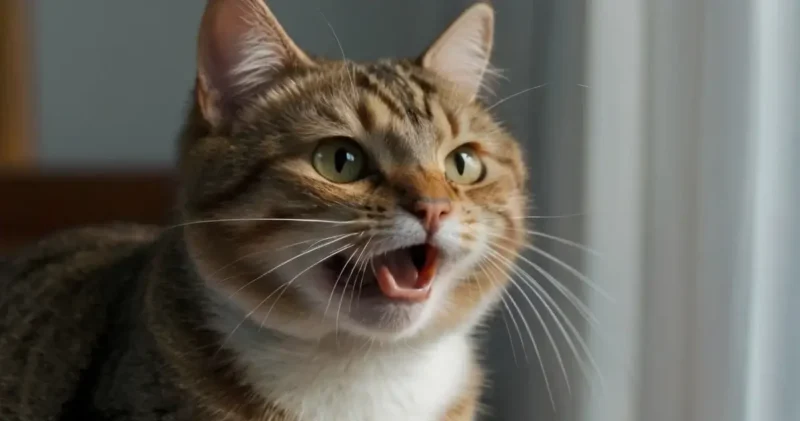
Surely, you would have encountered instances of cat vomiting. Being a cat owner myself, I’ve witnessed it numerous times. Have you ever paid attention to the unsettling sound they make just before vomiting? Understanding why cats expel undigested food might be a concern for you as well. I found myself pondering the same question until I took the time to conduct some research. To facilitate your understanding, I’ve compiled responses to common inquiries regarding cats’ vomiting tendencies onto a single page for your convenience.
There can be multiple reasons for which cats yowl before vomiting. It might be a sign of discomfort. They can be angry, upset or afraid. Some cats usually have developed a terrified sound that signals the pet owners that their feline friend is about to throw up.
Why Do My Cat Meows Before Throwing Up?
Every cat differs in nature. Some cats are really friendly but on the contrary, there are those too which even don’t like interacting with other cats. Just like humans there are some introvert cats too which throw up so quietly that the members of the house even get to know about their vomit after a number of hours.
On the other hand, there are those too which makes noise and yowl for a couple of minutes and then throw up the indigested food. Now the question arises that why some cats yowl and why not?
Each cat has a different level to bear pain and each cat experiences different level of pain. If your cat makes noise, she might be experiencing more pain. Some cats get horrified and undergo stress. In such conditions, their behavior also changes and they get noisy. If your cat is born with a silver spoon and always pampered by you, she will definitely yowl more to divert your attention towards her. Such cats are normally more sensitive than routine cats.
Why Is My Cat Throwing Undigested Food?
There can be multiple reasons for which your cat throws up on daily basis. Since a cat spends multiple hours on grooming, she undergoes stress which triggers other health issues too. All these collectively affect her digestive system. As time passes and cat’s issues are not paid attention or you mistakenly forgot them, she gets weaker and weaker.
There are some other reasons too which include fast eating, a diet with lack of nutrition, feeding human food to your cat and some serious infections. It is a fact and can never be denied that human food is not meant for cats. Yes, they can have it occasionally but you have to be very careful when feeding her with human food with little quantities on different occasions. Just like you feed a human child in infancy.
If you don’t regularly take your cat to a vet for routine check-up, there are chances that some infection or some bacteria might develop in her intestines, abdominal region or digestive track resulting in continuous vomiting of undigested foods.
Some common and serious issues are addressed below:
Hairballs
Cats do lick themselves for 5 hours a day. This is the reason; their saliva contains many harmful bacteria and should be immediately removed if you found it somewhere on floor or any other place in your house. If you regularly brush your cat, still some of her hairs are swallowed by her. These hairs get stuck in throat and if passed, they don’t pass through her intestines creating blockages. With the passage of time, the number of hairs she swallows increases which combine and become a huge ball.
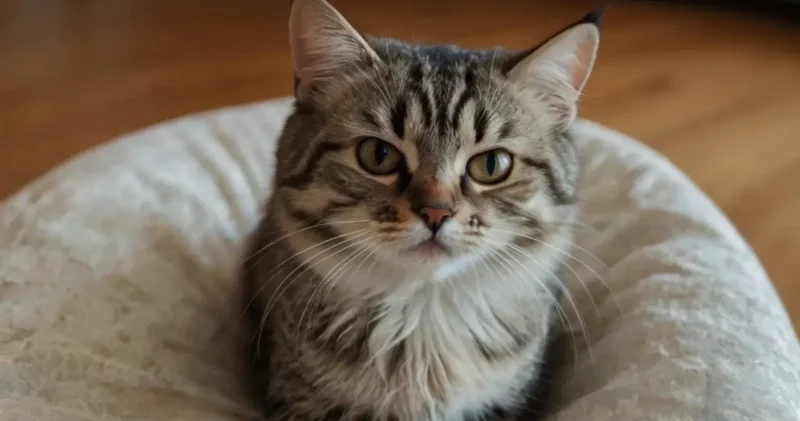
This huge hairball offers a lot of pain to the innocent cat. Some people usually mix petroleum jelly in her food so she can easily pass it out with her bowl. These stuck hairballs in her intestine become a cause for indigestion of food which eventually ends up throwing up.
It not only causes weakness in cat but gives her a sense of discomfort and pain. Still this can be resolved.
How To Resolve Hairball In Cats?
Hairballs in cats can be resolved by adopting following strategies:
- Brush her daily
- Add some laxatone in her diet
- Change her diet
- Feed her plenty of water to keep her body hydrated
Cat Eating Too Fast
Some cats exhibit voracious eating habits, seemingly devouring their food as if it were their last meal. Admittedly, my own cat displayed such behavior about a year ago. Initially, I attributed it to their routine, but after consulting a veterinarian, I realized it required attention.
Rapid ingestion can indeed lead to digestive issues. In my case, the problem stemmed from extended intervals between meals. I would feed my cat after long breaks, exacerbating her hunger. This approach was misguided; instead, cats should be fed smaller portions at shorter intervals. Determining the appropriate quantity for your cat’s digestion capacity can be achieved through consultation with a vet.
Additionally, other factors such as underlying medical conditions or stress and anxiety may contribute to this behavior. If you find yourself wondering how to address your cat’s fast-eating tendencies, the solution lies in curbing their greed and hunger for food.
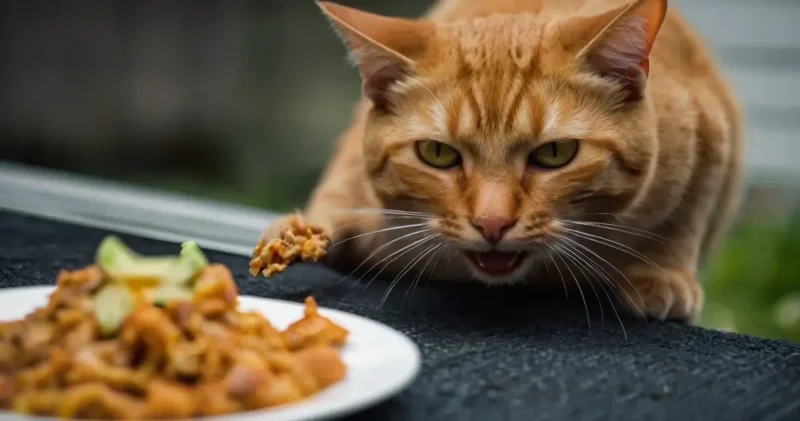
How To Resolve Fast Eating Habit In Cats?
You can bring a solution to this issue by adopting the following suggested measures:
- Feed her with wet-food or soft dry food
- Divide her meals
- Feed her with your own hands
- Provide her a calm environment while feeding her
- Use a slow feed bowl
After implementing all these measures, you should consult a vet to suggest you the appropriate quantity of per meal you cat can digest. He may also recommend you the time lapse between different meals depending upon the age and size of your cat.
Food Sensitivities
While many pet foods are generally safe for cats, some may prove toxic to certain individuals. It’s important to recognize that not all cats will react negatively to the same food. To gauge the potential toxicity of a specific food for your cat, observe her closely for the next 24 hours after feeding. Symptoms of toxicity may manifest as unusual behavior, such as lethargy, discomfort, aggression, or vomiting. Monitoring these reactions can provide valuable insights into your cat’s tolerance and help ensure her well-being.
Moreover, many feline enthusiasts harbor a desire to share their meals with their beloved pets. However, it’s crucial to acknowledge that certain human foods can pose severe toxicity risks to cats, often beyond our imagination. The table below outlines the adverse effects of various ingredients commonly found in human food.
| SR.NO | INGREDIENT | DISADVANTAGES |
|---|---|---|
| 1. | Salt | Dehydration, hypertension, increased urination |
| 2. | Sugar | Dental issues and pancreatitis |
| 3. | Caffeine | Gastrointestinal issues affecting digestive system |
| 4. | Sauces | Allergies, digestive upset, obesity |
| 5. | Chocolate | Vomiting, diarrhea, restlessness, muscle tumors |
| 6. | Alcohol | Breathing issue, affects cat’s nervous system |
| 7. | Baking powder/baking soda | Indigestion, electrolyte imbalance |
Stop feeding your cat with human food is the only solution to this. I know, it would be heavy on your heart but for your cat’s healthy life, you will have to do this. If you are facing difficulty choosing the correct diet for your cat, you can click at the link below to purchase premium cat food at the cheapest rates:
You can also click at the image below to purchase cat food:
To know more about the sensitivity of human food for cats you can click here.
Gastrointestinal Issues In Cats
There are numerous types of gastrointestinal issues in cats including vomiting, diarrhea, constipation, inflammatory bowel disease, tumors, pancreatitis and malabsorption dis-orders however vomiting and diarrhea are the most common ones. There can be numerous reasons for these issues.
Cats can develop sensitivities or allergies to certain food ingredients, leading to gastrointestinal symptoms. Dietary changes and environmental changes play the biggest role. Foreign objects, such as string or small toys, can block the digestive tract, causing vomiting and constipation. These gastrointestinal issues are the major cause your cat yowl before throwing out undigested food.
How Can I Avoid My Cat From Having Gastrointestinal Issues?
Here are some suggested tips which can reduce gastrointestinal issues in your cat:
- Gradually transition your cat to new foods to avoid dietary upsets.
- Minimize stress
- Keep an eye on your cat’s intake
- Minimize exposure to toxic substances
- Keep your cat hydrated
Hope so, these will resolve your issue but still there is a place for vet’s consultation. You can consult your vet regarding other gastrointestinal issues too.
Change In Environment
Many of us think that cats are environment friendly and easily get attached to the new environment but it’s not truth. Cats are usually attached to the environment they live in. They love having food at their usual time, prefer having sleep in their bed and pee in their litter box. Cats usually undergo stress if they face a change in environment, they live in.
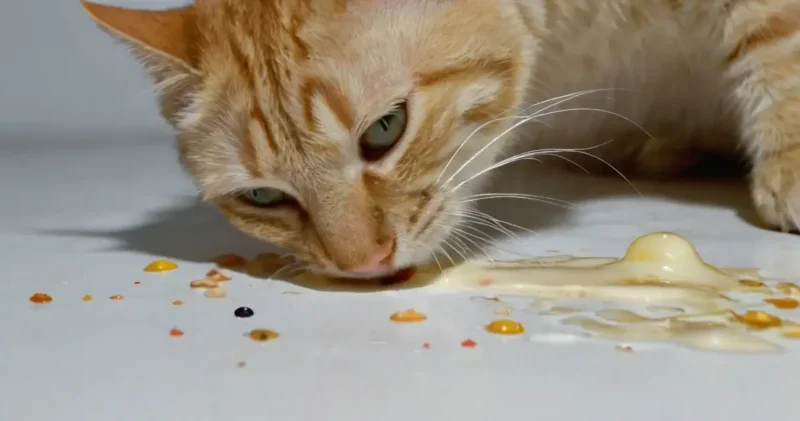
If you have recently changed your house or trying to bring changes in your cat’s routine or diet plan, this can be highly stressful for cats. Change of ownership can be harmful for your cat too. These environmental changes can be cause of affected digestive system and continuous vomiting by your cat.
However, serious decisions like change of residence cannot be altered according to your pet’s need but some precautions can be adopted to make it normal for your pet. Here I have mentioned few suggestions which can pave a way for you to make decisions without fear of your feline friend’s health.
- Have some quality time with your cat
- Avoid sudden environmental changes
- Gradually bring changes
- Maintain her diet
- If you are willing in change of diet, don’t implement new diet plan immediately. Change each meal gradually.
If your cat’s vomiting persists or worsens, consult with your veterinarian. They can perform a thorough examination and may recommend tests to rule out underlying medical issues. To explore more about how environmental changes can affect your cat’s health, you can click here.
Do Cats Throw Up When Upset?
Yes, cats have much similar emotions to humans. Any of the above discussed causes can be a reason for your cat to get upset. Getting upset welcomes stress to your cat. This stress is the reason for which your cat exhibits frequent vomiting.
Treating your cat in a better way can resolve the issue but still if your cat is vomiting frequently or exhibits other signs of distress, it’s advisable to consult with a veterinarian. They can help identify the underlying causes and recommend appropriate treatments.
Getting upset not only affects digestive system but it also impacts other habits too. Your cat begins to behave lazy. you may notice pacing or restlessness, hiding, decreased appetite, vocalization, hypervigilance, trembling, salivation, and excessive grooming. You can click here to explore more.
Do Cats Throw Up To Get Attention?
Cats don’t intentionally throw up to seek your attention however there throwing up can gather your attention. Today, humans are so much busy in their hectic life that they don’t even have time for their loved ones. In case, you have a busy schedule, it is likely for your cat to feel neglected. This neglection can borrow stress and anxiety.
Spending some playful time with your pet and taking it to regular walks can solve the issue. It might be tough for you to manage some time for your pet but your pet cannot recover until you put on your efforts too.
How Do I Know If My Cat Is About To Throw-Up?
Cats sometimes show signs when they’re going to throw up. Look out for things like weird coughing or gagging sounds, like when they have a hairball. Your cat might drool more, which means their tummy is upset. They might start licking their lips. They could crouch down a bit and not want to eat before vomiting. If you notice these signs, you can get ready and clean up after them if they do get sick.
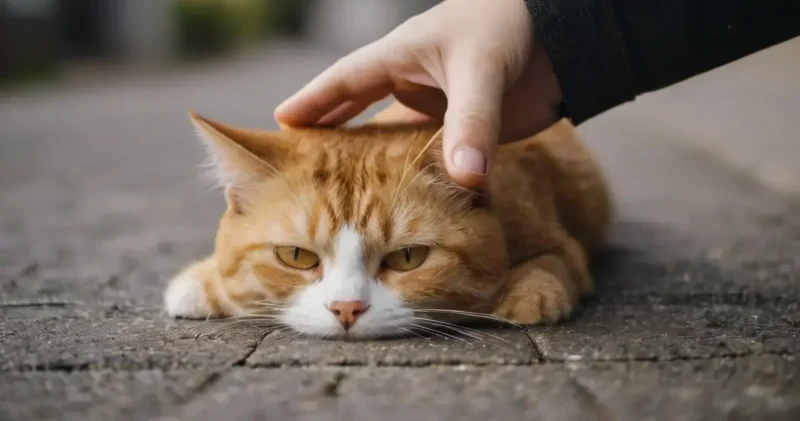
If you notice any of these signs, you can minimize the mess by
- Prepare a designated area maybe outside your house or in car porch where you have to do minimum efforts for cleaning up.
- Notice every movement of your cat
- Once your cat has vomited, make sure to clean up to remove all traces and odor.
How Can I Prevent My Cat From Throwing Up?
You can adhere to a number of precautions which can help you reduce the redundancy of vomiting or throwing up of undigested food by your cat since it might be a great concern for you as a cat owner and feline lover. Here I have discussed few easy to adapt and possible solutions:
- Make sure, your cat is getting every desired nutrient. A nutrient deficient diet is also a cause of vomiting in cats.
- Consult a vet to check what foods your cat is sensitive too. Avoid giving those foods and also avoid feeding human diet to cats
- Keep your cat hydrated and brush her daily to reduce the chances of formation of hairball.
- Spend quality time with your cat to minimize the chances of stress and anxiety.
- Don’t allow your cat to consume toxic food and non-eatables.
- Regularly visit a veterinarian’s clinic to avoid any gastrointestinal issues.
These measures can greatly reduce the frequency of vomiting in your cat. Still if it doesn’t work, you should set an appointment to vet.
Why Is My Cat Throwing Up White Foam?
Cat vomit is more often undigested food, but sometimes they can vomit out white foam as well. The white foam your cat is spitting out is actually a mixture of mucous and fluids that can be found in a cat’s stomach. Actually, it represents that your cat is vomiting empty stomach. It usually occurs at serios stages of vomiting. You should pay heed towards this issue.
It can be caused because of following reasons:
- Nausea
- Infections
- Gastrointestinal irritation
- Hairballs
This is an unusual issue and should be reported to vet as soon as you notice it. Ignoring it can be dangerous for your cat.
Conclusion
Hope so You have found answer to question Why Do My Cat Meows Before Throwing Up? from the discussion above. To conclude, we can say that this is an important issue which should not be ignored and addressed properly. There can be numerous reasons for this as discussed above. Along them, their solutions are also discussed. Still I can assume that you might be thinking of “when to get worry for your cat?”. You should get worry for your cat at the very initial stage because every crucial stage is a result of ignoring the initial stage. However the condition gets tense when you observe blood in vomits, lack of appetite and cat hiding from you.
Under such conditions, you should schedule an appointment to an experienced vet.
FREQUENTLY ASKED QUESTIONS
We will be delighted to find you reading our other research posts too:
Can Cats Eat Banana Bread? 8+ reasonings

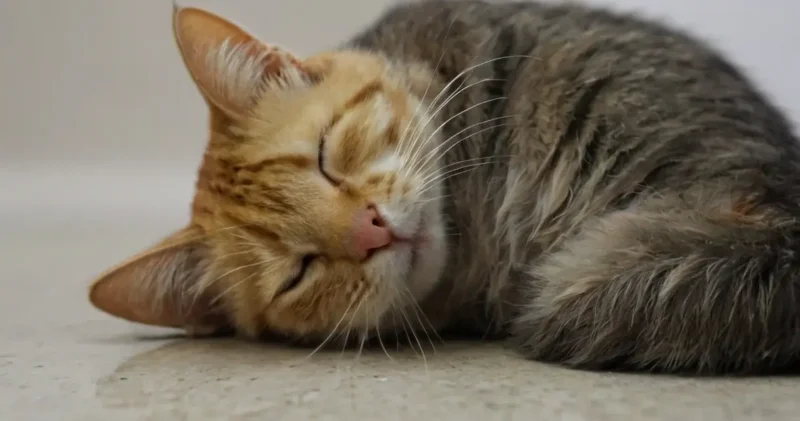


2 thoughts on “Why Do My Cat Meows Before Throwing Up White Foam? 5 Secret Causes”